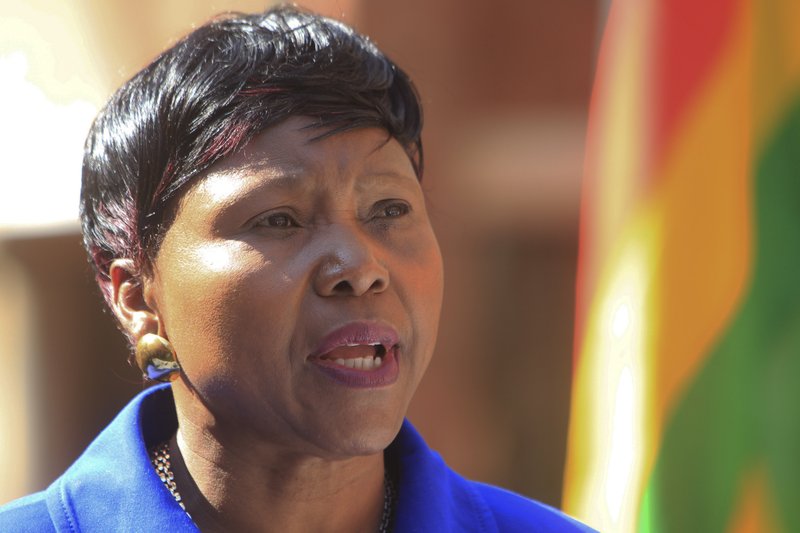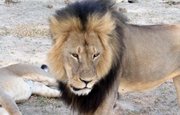HARARE, Zimbabwe -- Zimbabwe will seek the extradition of an American dentist who killed a lion that was lured out of a national park and caused international outrage, a Cabinet minister said Friday.
In the Zimbabwean government's first official comment on the killing of Cecil the lion, the environment, water and climate minister lashed out at Walter James Palmer, accusing him even of trying to hurt Zimbabwe's image.
"Unfortunately it was too late to apprehend the foreign poacher as he had already absconded to his country of origin," Oppah Muchinguri told a news conference. "We are appealing to the responsible authorities for his extradition to Zimbabwe so that he be made accountable."
On Tuesday, Palmer issued a statement saying he relied on his guides to ensure the hunt was legal. Two Zimbabweans -- a professional hunter and a farm owner -- have been arrested in the killing of the lion, an act that has garnered worldwide condemnation. Palmer has kept a low profile, but on Friday U.S. federal wildlife authorities said they have been contacted by a representative of the Minnesota dentist.
The killing of Cecil gained global attention as the United Nations General Assembly unanimously adopted a resolution Thursday aimed at combating illegal wildlife trafficking and poaching, the culmination of a two-year campaign led by Gabon and Germany.
"We very much welcome the decision by the General Assembly which will help in the protection of wildlife, of fauna and flora," Stephane Dujarric, the spokesman for U.N. Secretary-General Ban Ki-moon, said.
Palmer is believed to have shot the lion with a bow on July 1 outside Hwange National Park, after it was lured onto private land with a carcass of an animal laid out on a car, Zimbabwean conservationists have said. Some 40 hours later, the wounded cat was tracked down and Palmer killed it with a gun, they said.
"There has been an outcry," Muchinguri said. "Almost 500,000 people are calling for his extradition and we need this support. We want him tried in Zimbabwe because he violated our laws."
She did not explain the 500,000, but there are online petitions demanding Palmer's extradition.
"I have already consulted with the authorities within the police force who are responsible for arresting the criminal. We have certain processes we have to follow," Muchinguri said at the offices of the national parks and wildlife authority. "Police should take the first step to approach the prosecutor general who will approach the Americans. The processes have already started."
She said both Palmer and professional hunter Theo Bronkhorst violated the Parks and Wildlife Act, which controls the use of bow and arrow hunting. She said Palmer, who reportedly paid $50,000 to hunt the lion, also violated the act through financing an illegal hunt. The landowner violated the act because he "allowed a hunt to be conducted without a quota and necessary permit," Muchinguri said.
Meanwhile, the U.S. Fish and Wildlife Service tweeted Friday that the agency was voluntarily contacted a day earlier by a representative of Palmer. An agency spokesman verified the tweet, but declined further comment.
There is an extradition treaty between Zimbabwe and the United States.
The U.S. Embassy in Zimbabwe said Friday that it does not comment on extradition matters, and the Zimbabwe Embassy in Washington said it had yet to receive instructions.
"We are trying other avenues," said Richard Chibuwe, the deputy chief of mission at the embassy in Washington. "Seeking extradition would be the last resort."
Muchinguri accused Palmer of "a well-orchestrated agenda which would tarnish the image of Zimbabwe and further strain the relationship between Zimbabwe and the USA."
Zimbabwe and the United States have often sparred over the years. The southern African country has blamed its economic woes on U.S. sanctions against President Robert Mugabe and close associates, though many commentators have attributed Zimbabwe's economic decline to mismanagement. Washington imposed the penalties on Zimbabwe because of human rights concerns. More broadly, Mugabe has long railed against what he calls Western meddling in Africa, saying it is an extension of the colonial rule of the past.
Authorities seeking Palmer's extradition have described him as an accomplice to the illegal hunt. But they have not specified what charges might be laid against him, meaning it is unclear what penalty he could face if he is tried and convicted.
Bronkhorst was released on $1,000 bail after appearing in court in Hwange, about 435 miles west of the capital Harare, according to his defense lawyer, Givemore Muvhiringi.
If convicted, Bronkhorst faces up to 15 years in prison.
Palmer, 55, is a dentist in the Minneapolis suburb of Bloomington. In a note to his patients, he wrote: "I understand and respect that not everyone shares the same views on hunting." He said he would resume his dental practice "as soon as possible."
The lion's head, which was severed by the hunters, has been confiscated by the wildlife authorities, according to Zimbabwe's Director of National Parks and Wildlife Edson Chidziya.
He added that there had been no reports so far of Cecil's many cubs being killed by rival male lions, as often happens when the alpha male in a pride dies.
"We believe the cubs are still out there in the bush," he said, adding that no rescue missions were planned.
Information for this article was contributed by Steven R. Hurst and Edith M. Lederer of The Associated Press.
A Section on 08/01/2015

